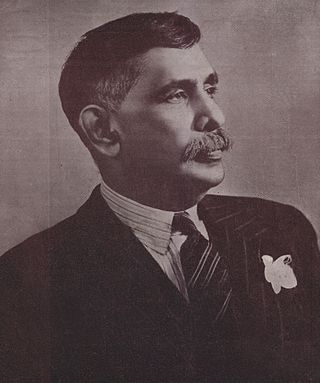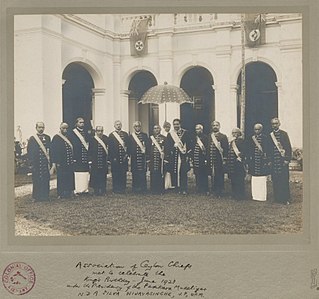Sri Lankan independence activists are those who are considered to have played a major role in the Sri Lankan independence movement from British Colonial rule during the 20th century.

Don Stephen Senanayake was a Ceylonese statesman. He was the first Prime Minister of Ceylon having emerged as the leader of the Sri Lankan independence movement that led to the establishment of self-rule in Ceylon. He is considered as the "Father of the Nation".

The Sri Lankan independence movement was a peaceful political movement which was aimed at achieving independence and self-rule for the country of Sri Lanka, then British Ceylon, from the British Empire. The switch of powers was generally known as peaceful transfer of power from the British administration to Ceylon representatives, a phrase that implies considerable continuity with a colonial era that lasted 400 years. It was initiated around the turn of the 20th century and led mostly by the educated middle class. It succeeded when, on 4 February 1948, Ceylon was granted independence as the Dominion of Ceylon. Dominion status within the British Commonwealth was retained for the next 24 years until 22 May 1972 when it became a republic and was renamed the Republic of Sri Lanka.

Edmund Peter Samarakkody was a Ceylonese lawyer, trade unionist, politician and Member of Parliament.

Mudaliyar was a Ceylonese colonial title during Portuguese and British rule of the island. Stemming from the native headman system, the title was usually hereditary, made to wealthy influential families loyal to the British Crown.

Dr. Cristopher William Wijekoon Kannangara was a Sri Lankan Lawyer and a politician. He rose up the ranks of Sri Lanka's movement for independence in the early part of the 20th century. As a lawyer he defended the detainees that were imprisoned during the Riots of 1915, many of whom were the emerging leaders of the independence movement. In 1931, he became the President of Ceylon National Congress, the forerunner to the United National Party. Later, he became the first Minister of Education in the State Council of Ceylon, and was instrumental in introducing extensive reforms to the country's education system that opened up education to children from all levels of society.

Edward Walter Perera was a Ceylonese barrister, politician and freedom fighter. He was known as the "Lion of Kotte" and was a prominent figure in the Sri Lankan independence movement, served as an elected member of the Legislative Council of Ceylon and the State Council of Ceylon.

Sir Edwin Aloysius Perera Wijeyeratne, known as Edwin Wijeyeratne, was a Sri Lankan lawyer, politician, diplomat, and one of the founding members of the Ceylon National Congress and the United National Party. He was a Senator and Minister of Home Affairs and Rural Development in the cabinet of D. S. Senanayake. He thereafter he served as Ceylonese High Commissioner to the United Kingdom and Ceylonese High Commissioner to India

National Hero is a status an individual can receive in Sri Lanka for those who are considered to have played a major role in fighting for the freedom of the country. The status is conferred by the President of Sri Lanka. The recipients of the award are celebrated on a Sri Lankan national holiday, National Heroes’ Day, held annually on 22 May. Every year, the President and general public pay tribute by observing a two minutes silence in their memory. The individuals are also celebrated on Sri Lanka Independence Day, held on 4 February. In this, the President or Prime Minister will typically address the nation with a speech honouring the National Heroes. The award has only been awarded to Sri Lankan citizens, but is not limited to this group.

Don Richard Wijewardena was a Sri Lankan press baron who was involved in the Sri Lankan independence movement. A successful entrepreneur, he established Lake House newspapers and played a significant role in the independence movement.

The British Ceylon period is the history of Sri Lanka between 1815 and 1948. It follows the fall of the Kandyan Kingdom into the hands of the British Empire. It ended over 2300 years of Sinhalese monarchy rule on the island. The British rule on the island lasted until 1948 when the country regained independence following the Sri Lankan independence movement.

Henry Woodward Amarasuriya was a Ceylonese plantation owner, politician, educationist and philanthropist. He was the Cabinet Minister for Trade and Commerce in the cabinet of D. S. Senanayake. A former member of the Ceylon state council, H. W. Amarasuriya was a founding member and the first general secretary of the United National Party. He also held the position of Deputy Speaker and Chairman of Committees in the first parliament of Ceylon. A member of the first Education Executive Committee of the state council and a former general manager of the Buddhist schools, he did a great service to improve the education in Ceylon.
The Ceylon National Congress (CNC) was a Nationalist political party which was formed in Ceylon on 11 December 1919. It was founded after nationalism grew quite intensely in the early 20th century during the British Colonial rule in Ceylon. It was formed by members of the Ceylon National Association and the Ceylon Reform League. The Ceylon National Congress played an instrumental role in the attainment of Sri Lanka's independence later in 1948. Sir Ponnambalam Arunachalam was the founding president of the party. In October 1920, Sir James Peiris was elected president, staunchly supported by F.R. Senanayake and D.S. Senanayake. Other former presidents include D. B. Jayatilaka, E. W. Perera, C. W. W. Kannangara, Patrick de Silva Kularatne, H. W. Amarasuriya, W. A. de Silva, George E. de Silva and Edwin Wijeyeratne. The Ceylon National Congress later paved the way for the formation of the United National Party. In 1943, D.S. Senanayake resigned from the Congress because he disagreed with its revised aim of achieving full freedom from the British Empire, preferring Dominion status.
Lanka Mahajana Sabha was a Ceylonese political party founded by F. R. Senanayake in 1919. It was affiliated to the United National Party in 1946 and played an important role in attainment of Sri Lanka’s independence in 1948. Its members included the first prime minister of Ceylon, Don Stephen Senanayake, his brother Don Charles Senanayake, Sir Don Baron Jayatilaka, Sir Wilfred de Soysa, Dr. Charles Alwis Hewavitharana and others. Henry Woodward Amarasuriya was the president of the party for 44 years.

Nidahase Piya DS is a 2018 Sri Lankan Sinhala biographical film directed by Suneth Malinga Lokuhewa and co-produced by Wijeyadasa Rajapakshe, Dilman Jayaratne, Channa Hettiarachchi, Rajaputhra Weerasinghe, Kithsiri Athulathmudali and Clarance Kumarage. It stars an ensemble cast of many popular actors, with Lakshman Mendis in the lead role, with Thumindu Dodantenna and Saranga Disasekara in supportive roles. Music composed by Samantha Perera. It is the 1313th Sri Lankan film in the Sinhala cinema.